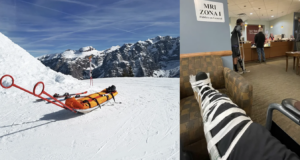This is the 7th installment of Pamela’s Summer of Learning Series.
I couldn’t have scripted this past year if I’d tried.

While training for my reclaimed passion for alpine ski racing in Colorado, I had a particularly harrowing crash and blew out my knee (ACL, MCL, tibia fracture—the works).
It happened almost on cue—just days after I had submitted the final manuscript for my book, Staying in the Game.
Even as I lay there on the mountainside waiting for what my fellow racers cheekily call the “meat wagon,” the irony wasn’t lost on me: Just as Staying in the Game was launching, I was pulled out of the game!
While none of us sign up for big setbacks, they often end up being opportunities to step back, regroup, and repriotize our energy and resources. Setbacks are also fertile ground for new learning and growth.
Here are a few of the biggest lessons I learned to help you turn your inevitable setbacks into even stronger agile comebacks:
Progress, Not Perfection
 Thankfully, I found inspiration to start my comeback by reading the final proofs of Staying in the Game:
Thankfully, I found inspiration to start my comeback by reading the final proofs of Staying in the Game:The director of the British cycling team, Sir David Brailsford, is legendary for his focus on “marginal gains.” He discovered that he and his team could exponentially improve results by making—and celebrating—1% improvements in a wide range of variables that impact performance. These have included sixteen gold medals in two Olympics and seven Tour de France wins in eight years.
If I made a little progress in some area each day or week (compassionately allowing for setbacks), I knew I would eventually achieve my goal of returning to snow.
Adopting a “progress, not perfection” approach to learning will help you maintain a growth mindset.
As you continue your leadership agility journey, continuous engagement is more critical than any illusory destination.
I say illusory because now more than ever, we know that whatever destination you set for yourself (e.g., understanding and integrating AI into your work) is like a mirage on the horizon—it will only change or move farther away as you get closer.
Celebrate Small Wins
 We all need to see and acknowledge progress to stay engaged. This is especially true for long and complex endeavors that will likely include their share of setbacks.
We all need to see and acknowledge progress to stay engaged. This is especially true for long and complex endeavors that will likely include their share of setbacks.“In their research of individual contributor and team engagement, Harvard’s Theresa Amabile and Steven Kramer found that even incremental progress toward shared goals and acknowledgment of accomplishments can make the difference between perseverance through obstacles and demoralized derailment.1 Acknowledgment of progress not only amplifies the meaning and purpose of our efforts but also makes it more enjoyable, two critical ingredients for long-term engagement.’ —From Staying in the Game.
The brain needs positive feedback to stay engaged. To support our learning success, the hypothalamus in the brain rewards us with a dose of dopamine, sometimes called “the happiness hormone.”
Find Hope in Other People’s Stories
 On days when I was flagging or experienced a setback, I took heart in hearing and reading other people’s come-back stories.
On days when I was flagging or experienced a setback, I took heart in hearing and reading other people’s come-back stories.
I found inspiration in the queen of comeback stories, Olympic and World Cup Champion Lindsey Vonn.
Hearing the stories of other masters athletes who had recovered from far worse kept me going. The same applies to the inevitable obstacles and setbacks you will experience in your learning journey.
3 Ways to Make and Celebrate Your Progress
-
Ask for Help: When you encounter an obstacle or need a resource or sounding board, phone a friend, email a mentor, or post on your team platform. Not only will you benefit, but you will also give others permission to do the same and foster a culture of collaboration.
-
Make it Meaningful: Celebrating progress can be as small as raising a glass with a friend, announcing your milestone on your team call, or posting your success on LinkedIn. Most importantly, do it meaningfully while inviting people to cheer you on.
-
Pay it Forward: Now that I am fully recovered, I am keenly attuned to others in the rehab stage. If I see someone wearing the tell-tale post-op knee brace, I make it a point to engage and encourage them. Keep your eye out for opportunities to do the same for your colleagues. There’s nothing like hearing “it gets better” from someone who’s been there.
Bonus Resource
Read More of my comeback story and 11 Lessons Learned in the Year Following My Terrible, Horrible, No Good, Very Bad Day. NOTE: Some lessons are ACL-specific but can be applied to any setback.
